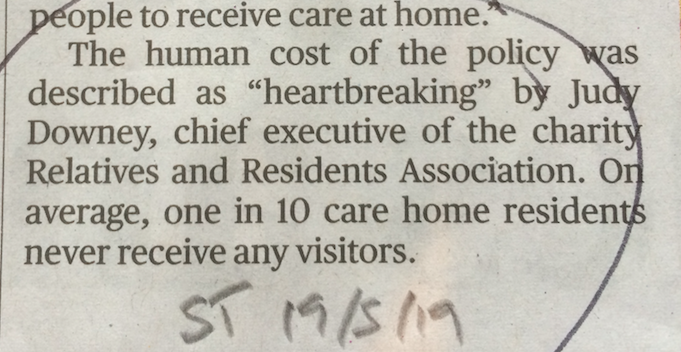100 years ago in the UK 24 people were aged 100+ Last year (2021) the number was over 10,000.
Category Archives: Ageing
Robots Vs. People
 I attended a conference on AI at Cambridge University last week and one of the most interesting points was why we were developing robots to look after old people – why not just use people? The answer could be that we are running out of people, especially younger people, as is the case in Japan, but this simply begs another question. Why don’t we either educate younger people on the importance of looking after older people, especially one’s own relatives, or simply conscript younger people into the NHS for short periods (a wonderfully provocative idea proposed by Prof. Ian Maconochie at an Imperial College London lecture the other week).
I attended a conference on AI at Cambridge University last week and one of the most interesting points was why we were developing robots to look after old people – why not just use people? The answer could be that we are running out of people, especially younger people, as is the case in Japan, but this simply begs another question. Why don’t we either educate younger people on the importance of looking after older people, especially one’s own relatives, or simply conscript younger people into the NHS for short periods (a wonderfully provocative idea proposed by Prof. Ian Maconochie at an Imperial College London lecture the other week).
Dying alone
The number of paupers’ funerals in London almost doubled between 2013-2016 according to the latest figures. A pauper’s funeral is one in which people die alone or without known relatives and the cost of the funeral is met by the local authority. The reason given for the increase is longer human lifespans, squeezed incomes, the rising cost of traditional funerals and the increase in the number of people living alone.
In the past you needed life insurance in case you died. In the future you’ll need it in case you don’t.
Ageing and the NHS
It’s not often that you’re in the car and have to pull over to write something down that you’ve just heard on the radio. A few days ago I did exactly this because someone said that a King’s Fund study had said that the average age of a patient in NHS hospitals in the UK was 80. Moreover, 2 out of 3 admissions are for people aged 65+
More here.
Demographic shifts
Could Death Ever Be The New Sex?
Here’s a weird one – or perhaps not. Back in Victorian times death was a popular subject of conversation. How things have changed. Death is now sanitised and practically invisible, as opposed to sex, which seems to be everywhere. But things might be slowly changing again, especially with the rapid ageing of most Western nations, which would presumably create more of an interest in death and dying and less of an interest in sex. Enter Death Cafes. The Death Cafe movement started around 2011 and has already spread to the US. The idea consists of people sitting down to drink tea and coffee, eat cake and discuss death. Sounds creepy, but why not?
Some impacts of ageing on business
“Over the next couple of decades nothing will impact OECD countries more profoundly than demographic trends.” Jean-Philippe Cotis, Chief Economist at the OECD.
We all know the numbers: People over 65 will grow from 7% of world’s population to 15% by 2050; 1/3 of US workers now aged 50+; More than 1/3 of the babies born in the UK today will live to 100+; This year there will be 14,500 contrarians in the UK. By 2035, there are expected to be 110,000
What does this actually mean going forward?
The interesting thing to me is why most organizations have only just noticed this. It is not like demographic data is highly unreliable or that we cannot see this coming from a great distance. It’s the classic elephant in the boardroom.
I think the reason for business blindness is twofold:
First, it’s a classic case of something that’s important, but not urgent. Second, most organizations are run by relatively young people and they struggle to come to terms with what ageing really means. It’s not just ageing either. It’s shifts such as the decline of the nuclear family, ethnic diversity, blended families, extended financial families, same sex couples and single person households too.
Perhaps people think that because demographic trends move slowly it’s something someone else can worry about later on. That’s true, up to a point, but they are missing a growing segment (a segment with pretty much all of the money) and they are also falling into the trap of thinking that ageing is about ‘them.’ This is, of course, utter nonsense. Ageing is about ‘us.’ Ageing impacts everyone eventually.
With the constraint of time in mind, what are some of the key trends coming out of changing demographics that business can respond to?
Let’s briefly consider 3 trends:
Trend #1: Simplicity.
I offer myself up as a sample of one here. I am confused. I am perplexed. There is too much information, too much choice and too much complexity everywhere. I would like things to be simpler. I want supermarkets to stop trying to sell me 40 types of toothpaste and edit their selection to 10 or perhaps 15. I want my bank to stop selling 20 types of loans and filter it down to 5. I want a washing machine that doesn’t give me 100+ ways to wash my socks. I want to stop people saying that if I don’t want choice I can’t have it. I was happy with 3 TV channels. I don’t want 200. I feel I am not alone.
Apple is on to this. So is Philips. But I struggle to think of many others.
While I’m on the subject of simplicy, will retailers please start to produce packaging that people with older hands can actually open? Also, pack sizes that are friendlier to older people with smaller appetites. Some retailers are quite good about this. The Co-op is one. Morrison’s is another. The rest are rubbish.
Remember also that smaller pack sizes are not just about ageing customers. In the UK, 34% of households contain just one person. In the US it’s 28% (up from 9% in 1950). This is reality now, although, many retailers still have in their head the idea of a nuclear family – hence the ‘family pack sizes.’
Trend #2: The changing workplace.
When are employers going to wake up to what’s going to happen here. The biggest trend around is ageing. People aren’t dying like they used to. This means people consuming for longer, but it also means working for longer to pay for the things we consume. But there’s a twist. Younger people tend to buy goods. Older people tend to buy services and guess what? Services are people intensive. The problem is that as well as people not dying like they used to, they aren’t being born like they used to either. We are facing a fertility crisis, which means significant shortages of skilled labour going forward, especially labour to provide services for older consumers.
The good news is that older people will keep working (Actually that’s one of the biggest questions around– will we work for longer?). We’ll do this to pay for the fact that we are living and consuming for longer. However, we won’t do this if employers make working longer too difficult. Older workers need extended periods off for health reasons. They also require workspaces that are designed for ageing bodies. Some companies woke up to this long ago. Ford and BMW have designed factories to attract older workers.
Meanwhile, Wal-Mart, HSBC and McDonald’s have all found that older workers are friendlier and more loyal that younger workers and have a natural rapport with their older customers (the ones with all the money remember!). B&Q have found much the same thing, re-hiring retirees that have skills in various trades that intersect with the DIY market.
Older employees like a nap too. Finding and keeping talent is job #1 going forward so companies should act now to ensure that they’re not missing out on people due to inflexible contracts or poorly designed workspaces.
Trend #3: Remote monitoring
As I’ve said, one of the key consequences of societal ageing is more people living alone. This is problematic on one level because elderly singles need care, which is expensive. One solution is to allow people to stay in their own homes for longer, but how can we do this? One solution is home-based monitoring and telemedicine.
I’ll give you some examples: MIT Media lab has developed a ‘Smart bin’ that reads the barcodes of items that are thrown away. It can tell how much someone is eating and send a message to a carer if someone isn’t. Similarly, in Japan, there’s a kettle that learns when it’s usually picked up and can send a message to someone if it isn’t. There is even clothing that knows when someone has fallen over, and possibly why, and calls for help. We’ll see more of this kind of thing, aimed not only at seniors, but at kids too.
But beware. There is the strong possibility that these kinds of technologies will create further isolation. Technology alone cannot solve these problems and we must stop sending ‘them’ off somewhere else, out of sight and out of mind. People need other people, especially when they get older. They need to be loved and to know that they are not alone and machines, even cuddly robots, cannot do this.
We need to properly integrate old and young alike into society and also banish the idea that older people are somehow a burden. This is pure nonsense. For example, people worry that ageing will impact negatively on growth. Nonsense. We are on the cusp of various technologies that will see growth explode. Furthermore, expenditure on healthcare is rising fast, but surely increased expenditure on health will grow GDP, so what is everyone worrying about? (There might be an answer to this I haven’t seen, so answers on a postcard please).
Monday Statistic
The Ageing Opportunity

I’m often asked what you can practically do with some of these long-term trends like ageing. Well it’s not rocket science. It’s as simple as a good rocket salad. Here’s a great example of leveraging the ageing demographic from the UK. Link to site in comments.





